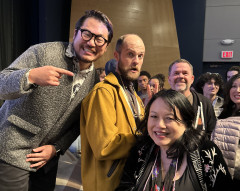Spotlight
2023 OSCARS WINS! EPIC NIGHT OF FIRSTS FOR WINNERS
'You Don't Know Jack:' The Story of a Renaissance Pioneer
Our Renaissance Guy gets to know the story of a REAL jack of all trades: Jack Soo.
After the premiere screen- ing of You Don't Know Jack: The Jack Soo Story , at the S.F. International Asian American Film Festival at the Sundance Kabuki theater, Dianne, my wife, turned to me as the applause wafted up to the stage, where the director and producer, Jeff Adachi , stood smiling. Until we saw this documentary of Jack Soo , we really didn't know Jack. But Dianne knows me, and she said, "Wow. You two had a LOT in common!"
And, of course, she was right. Soo, best known for his work in The Flower Drum Song , both in the film and on Broadway, and in the '70s sitcom, Barney Miller (he was the deadpan smart-alecky detective sergeant, Nick Yemane), was born in 1917, almost 30 years before I was, and was a Japanese American. Those are some big diffs. Two others: he was interned, along with thousands of fellow Japanese Americans, during World War II. And he became a star as an actor and all-around entertainer.
Still, watching this fascinating, well-researched, well-told biography -- a must-see for anyone interested in Asian American history and pop culture -- I was struck by more than a few harmonic notes:
For starters, we both were raised in Oakland, both went to Westlake Jr. High, and both wound up with unique names. Soo was originally Goro Suzuki; became Carl Suzuki, and then, after the war, when he began working nightclubs in the Midwest, changed his name to Jack Soo. In that climate, a Chinese-sounding surname ruffled fewer feathers.
We both loved baseball; Jack actually played on Oakland Tech's varsity team; I got only as far as a summer league at Lincoln Elementary before being drafted by my parents for restaurant work.
Both of us enjoyed writing -- Soo was an English major; I studied journalism and broadcasting (Jack, too, did a little radio, after the war) -- and never got acquainted with stage fright. In high school, I ran the weekly assemblies, told jokes and wrote songs and skits. In his internment camp, the Topaz Relocation Center in Utah, Jack, who'd already worked at nightclubs by then (including Andy Wong's Sky Room in SF's Chinatown), appointed himself "entertainment director" and lifted spirits by putting on shows with fellow internees, telling jokes and writing skits.
After the war, and when he returned to the Bay Area from the Midwest, he performed at Charlie Low's Forbidden City nightclub, where he was discovered by dancing legend Gene Kelly , who was scouting talent for The Flower Drum Song on Broadway. Many, many years later, I would have the pleasure of producing a CD with Larry Ching , another star at Forbidden City, after meeting him and his fellow performers while co-emceeing the premiere of Arthur Dong's documentary, Forbidden City, USA.
Even in our mutual affection for music and for singing, Soo and I have only one degree of separation, at the most. In the film, a friend of his tells how he enjoyed mimicking Bing Crosby and other singers of the day -- shades of me doing Elvis and Dino. Soo was an accomplished singer, and signed a contract with, of all labels, Motown, in the mid-'60s. He recorded, among other songs, "For Once in My Life," but it was shelved. Tony Bennett and others would also perform it, and, in 1968, Motown star Stevie Wonder cut an uptempo version of the song and took it to Number 2. Soo's beautiful, contemplative rendition is featured in You Don't Know Jack , and is one of many highlights of this film, studded as it is with TV and film clips, photos, and interviews. So, Motown. My own links are many. While at Rolling Stone , I interviewed Wonder and other Motown artists (Temptations, Miracles, Gladys & the Pips, Diana, Marvin Gaye, the Jackson 5 ) and wrote the main text of The Motown Album , a history of the fabled company.
One more thing Soo and I had in common: We were both kind of goofy-looking guys (OK, one of us was) with an eye for beauty. Soo, in 1945, married Jan Zdelar , a beautiful former model. 1945 was the year I was born, and, some 30 years later, I married Dianne Sweet , who coulda been a model, easy. Jan stood by Jack through thick and thin. Dianne? Ditto, even as I thickened.
It's likely that many Asian Americans will resonate with Jack Soo's story, but, in the end, he was singular, with his versatility, his history, and his resolution, from the get-go, that he was not going to kowtow to any Hollywood stereotyping of Asian characters. "He would not play ethnic stereotypes," says Adachi. He rejected subservient roles and wound up playing hip characters on various TV shows, including Valentine's Day with Tony Franciosa , and, of course, Barney Miller . Fellow cast members from both series illuminate the film, as do Soo's family and friends, including Nancy Kwan and George Takei.
Steve Landesberg, from the Barney Miller gang, speaks for many when he says, near the end of You Don't Know Jack : "I hope a lot of people get to see this, and know something about Jack."
The 70-minute documentary is making its way through film festivals; no word yet on a theatrical release or television airings. If and when I hear, you will, too. This one is well worth waiting for.
I SCREEN, YOU SCREEN: Congrats to the Center for Asian American Media (www.asianamericanmedia.org) for another boffo film fest, which drew some 20,000 movie-lovers to 97 screenings and events over ten days at various Bay Area venues.
Winners of juried competitions were Half-Life , directed by Jennifer Phang , for Best Narrative Feature (with a special jury prize to Tze Chun 's Children of Invention ). The award for best documentary feature went to The Mosque in Morgantown , directed by Brittany Huckabee ; a special jury prize went to Harry Kim , director, for Dirty Hands: The Art and Crimes of David Choe.
The audience award for best narrative feature was won by Fruit Fly , the latest from H.P. Mendoza , who gave us Colma: The Musical in 2006. Fruit Fly (which includes a cameo by Chi-hui Yang , the indefatigable director of the film festival) had its world premiere at the fest. And the biggest crowd pleaser among documentary features was Patsy Mink: Ahead of the Majority , directed by Kimberlee Bassford.





